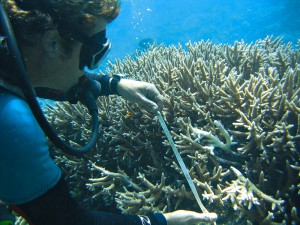Environmental Stewardship
 Quicksilver’s dedication to the preservation of this greatest natural asset has resulted in a much broader public and scientific understanding of corals and marine life in the Great Barrier Reef. We are committed to environmentally sustainable tourism and embrace Best Environmental Practices.
Quicksilver’s dedication to the preservation of this greatest natural asset has resulted in a much broader public and scientific understanding of corals and marine life in the Great Barrier Reef. We are committed to environmentally sustainable tourism and embrace Best Environmental Practices.
At our outer reef sites, we have used dedicated sites with permanently moored platforms since 1983. Our investment in these platforms, island operations and dive and snorkel sites has created a sense of stewardship to protect and preserve what we perceive as “our patches”.
Proudly we have attained Australia’s highest ecotourism certification and long term operational permits granted by the Great Barrier Reef Marine Park Authority in recognition of our commitment to environmental sustainability and best practice.
Ongoing research and monitoring
Our environmental division, Reef Biosearch, undertakes a variety of monitoring and research duties. Some of these include a crown of thorns starfish [cots] control program, the collection of marine stingers for anti-venom development, samples for water quality monitoring, and contributing to the ‘Eye of the Reef’ program which monitors coral health.
Many pilot research projects initiated by the company have gone on to be funded and developed by groups such as the Great Barrier Reef Marine Park Authority, the Australian Institute of Marine Science, the James Cook University of Queensland, and the Co-operative Research Council.
Best environmental practices
Special environmental measures are incorporated into our daily operations to protect and nurture the reef’s health. Instead of using toxic anti-foul on vessels’ hulls they are cleaned manually on a weekly basis, waste water from reef platforms is pumped into sullage tanks on the vessels and removed from the reef area, biodegradable detergents are specified and showers at the reef are designed without doors and shelves to conserve water usage and discourage soaps. We even operate two solar powered semi-submersibles.
Codes of Practice such as handling of animals protocol, fish feeding protocol, dive and snorkel protocols to name a few, ensure that our reef sites are maintained in pristine condition.
Education
In addition to interpretive programs, Quicksilver’s continuing policy of public education in the wider community includes free project trips for local Grade 7 school students and assistance for documentary film crews, journalists and visiting scientists.
Ultimately, Quicksilver would like all of our passengers to leave as ambassadors to reef protection and preservation.
 Quicksilver’s dedication to the preservation of this greatest natural asset has resulted in a much broader public and scientific understanding of corals and marine life in the Great Barrier Reef. We are committed to environmentally sustainable tourism and embrace Best Environmental Practices.
Quicksilver’s dedication to the preservation of this greatest natural asset has resulted in a much broader public and scientific understanding of corals and marine life in the Great Barrier Reef. We are committed to environmentally sustainable tourism and embrace Best Environmental Practices.











